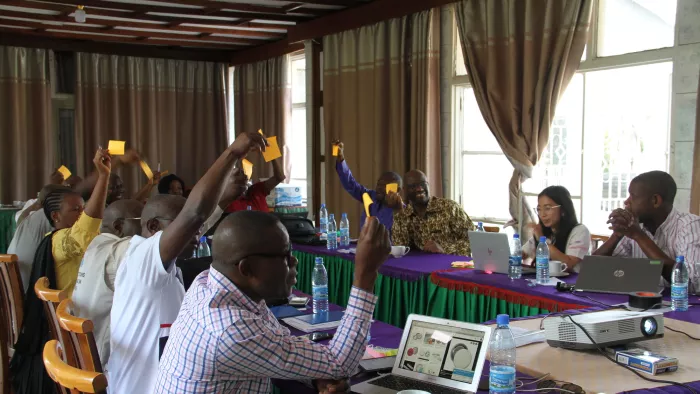ABOUT THE PROJECT
When disasters happen, international agencies rush to provide much-needed aid to those affected. The work they do is essential and rightfully supported by the international community.
But many do not realise that before international agencies arrive on the scene, local organisations are there assessing the situation and providing aid. They are the first responders; they know the context, speak the language and will be there long after international actors leave. Yet, their crucial role is often ignored by the current humanitarian system.
Meanwhile, disasters are becoming more frequent, unpredictable and complex and the international humanitarian system is under pressure to respond to increasing demand and new challenges. At this crucial time, ignoring the role of local agencies undermines the effectiveness of aid delivery everywhere.
Less than 2% of all humanitarian funding goes directly to local aid organisations despite local organisations often delivering aid more quickly, affordably and appropriately than international organisations. Local organisations also face greater risks (IFRC World Disaster Report, 2015), for example 90% of humanitarian workers who died in 2014 were local responders.
This project achieved a more acceptable balance between international and local responses to disasters; it shifted the balance of power towards locally led humanitarian response. The Shifting the Power Project strengthened national capacity for decision-making and leadership, helped national organisations achieve better representation, voice and recognition. At the same time it influenced international organisations to support and promote the work of local and national organisations.
AIMS
The project had three aims to achieve in the 3-year period that it was funded.
1. Strengthen national organisations in five countries and improve their emergency response and preparedness.
2. Support local and national organisations to be better represented and to have a stronger voice in relevant humanitarian platforms and networks.
3. Assisst consortium member INGOs to recognise and respond to L/NNGO capacity, leadership and voice
4. Provide evidence of good practice in strengthening L/NNGOs humanitarian preparedness and response work and their role/ influence in humanitarian action
ACTIVITIES
The capacity strengthening component of the Shifting the Power project revolved around an in-depth 2 year programme of support for 55 selected local partners in five countries to strengthen their capacity to determine and deliver humanitarian preparedness and response. The humanitarian capacity self-assessment and capacity strengthening plans were completed by each partner organisation using the 'Strategic Humanitarian Assessment and Participatory Empowerment' (SHAPE) framework. This framework was developed by the project based on a model of humanitarian capacity that emphasised the importance of power in the humanitarian system and recognised organisational attributes to not only deliver humanitarian response but also to control and influence the shape of that response.
The second focus area of the project was around supporting local actors in 5 countries so they are better represented and heard in their relevant platforms and networks. Each country took a different approach in achieving this and by doing so, ensured maximum relevance to their specific contexts. Additonally new approaches were identified and we were able to identify good practices.
The third area of work was to recognise the crucial role INGOs themselves play within the current power imbalance, and therefore work with the consortium member INGOs to recognise and respond to local/national organisations capacity, leadership & voice. Shifting the Power commissioned a research piece titled Localisation of Aid: INGOs Walking the Talk which builds on five country researches and a global research and puts forward concrete recommendations for the six Consortium INGOs to implement better the localisation of aid agenda. This research was done over 2016 and the final report was made available at the end of 2016. Now The research is now being used by the consortium agencies, and in each of the project countries to seek commitments to the research’s recommendations.
WHO WAS INVOLVED?
The project was delivered by a consortium led by ActionAid and the Catholic Agency for Overseas Development (CAFOD), and included Christian Aid, Tearfund, Oxfam and Concern.
WHERE DID THE PROJECT TAKE PLACE?
The project took place in Bangladesh, Pakistan, the Democratic Republic of Congo, Ethiopia and Kenya.
FUNDING
This three year project was funded with £4,876,636 from UK Aid, part of the Disaster and Emergencies Preparedness Programme (DEPP).
FIND OUT MORE
Shifting the Power Brochure
Shifting the Power two-pager
Year 1 Overview
Year 2 Overview
SHAPE Framework
Shifting the Power website for DRC

